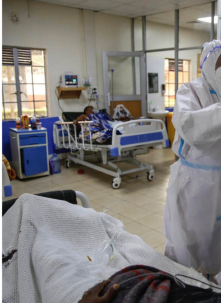Medical negligence WHO’s hefty note

Millions of patients suffer adverse events due to unsafe care, resulting in 2.6 million deaths yearly in low- and middle-income countries alone, according to the World Health Organisation (WHO), …”. Four out of ten patients suffer harm in primary or ambulatory care settings. The most significant errors relate to diagnosis, prescriptions and the use of medicines. Errors involving medicines alone cost an estimated US $42 billion a year. Up to 25% of patients suffer complications from unsafe surgical care, and every year one million people die during or immediately after surgery.”
In a press release made public on 13 September 2019, the World Health Organization (WHO) made us aware that “every year, millions of patients suffer adverse events due to unsafe care, resulting in 2.6 million deaths per year in low- and middle-income countries alone…” Four out of ten patients suffer harm in primary or ambulatory care settings. The most significant errors relate to diagnosis, prescriptions and the use of medicines. Medication errors alone result in an estimated annual cost of US$42 billion. Up to 25% of patients suffer complications from unsafe surgical care, and every year one million people die during or immediately after surgery”, states the document, which is still available online.
WHO went even further, revealing that: “…every minute, at least five patients around the world die as a result of unsafe care”, explained Dr Tedros Adhanom. These are moments that leave their mark on entire families, and sometimes cause outrage. This is illustrated by a number of cases in Senegal, South Africa, Burkina Faso and Cameroon.
Cases
In Senegal in September 2022, medical negligence and a clear failure to observe basic medical rules led to the death of a woman and her baby during childbirth in the south-east of the country. The husband and all the members of the deceased’s family almost set the hospital on fire, reports journalist Adama Soulé. “Dame Doura Diallo had presented during the day at the Kédougou health centre for childbirth before a decision by medical staff to perform surgery made too late, as the situation had already become complicated and the medical report sent to the authorities indicated that the gynaecologist’s manoeuvres to extract the newborn caused her death and caused a uterine rupture which immediately led to the mother’s death following external haemorrhage and cardiac arrest,” he informed us.
On 10 October 2019, in Burkina Faso, a renowned comedian also launched a campaign against negligence in hospitals, after his wife died on the delivery table, reports Toto Kellé, a compatriot based in the country of the upright.
In June 2023, the Africanews.com website reported that 29 people had died as a result of cholera, the treatment of which had been neglected by health professionals. On 25 October 2019, in Cameroon, the death of a newborn baby in a Douala hospital sparked a wave of indignation on social networks. The child’s parents have launched a campaign to denounce the negligence of the medical staff, information covered by Nos Soins.
Also in Douala, we heard from a colleague who had a big scare: “Born on 25 April 2018 in a public hospital in the city of Douala, which we don’t want to name for obvious reasons, my son was discharged from hospital three days later without having been consulted by a paediatrician.” Once home, I called the wife of a paediatrician colleague to come and check on the child. Just by looking at the child, she said he had jaundice. We immediately went to another public hospital in the city. The child was 6 days old at birth. The child’s jaundice was confirmed and a battery of tests were prescribed. He was put on treatment and placed in ultraviolet light. The nurses gave instructions not to take him out of there except to breastfeed him. Two days later, we were informed that the child was anaemic. He had to be transfused quickly. We are fighting to get a blood bag. Afterwards, the child was put back into the ultraviolet light. On the fourth day of hospitalisation, I went home at around midday to bring her some new clothes and do some housework. She called me at around 3pm, in tears, to tell me that the child had been transferred to the gynaeco-obstetric and paediatric hospital in Yassa.
It so happened that while my wife was removing the child’s nappies, she noticed a lump on the right side of his pubis. She informs the medical staff, who panic. The doctors arrived and said that if the child was not operated on within an hour, he would die. The hospital he was in didn’t have a paediatric surgeon. The doctor who spoke with my wife then made a few phone calls, notably to the Laquintinie hospital, then to the gynaeco-obstetrics and paediatrics hospital in Yassa. And he told my wife that the paediatric surgeon from the gynaecological hospital was waiting for her. In the meantime, they put catheters in the child’s nostrils and mouth and forbade her to breastfeed, because she was about to be operated on.
Since the one-hour deadline had to be met, my wife and her older sister took the motorbike to Yassa at around 4.30pm. Once at the gynaecological hospital, the formalities for paying the deposit took almost 45 minutes. 1 hour passed, and the child was not yet dead. He’s hungry and writhing in pain, but we can’t breastfeed him. It was finally around 7pm that we met the paediatric surgeon, who examined the child and expressed his surprise at the findings of his colleagues. He says that the child does indeed have testicular torsion, the undescended testicle, but that it’s not urgent and can be done even when the child is 1 year old. He notes that the operation is risky at her age and is not urgent, as the other doctor has pointed out. He prescribes medication to give to the child if this happens again. He removed all the tubes put in the child and asked the mother to breastfeed. We went home. The child is still doing well. We had him operated on in January 2023. This medical error almost cost my son his life. “When we left the hospital, the baby was 10 days old,” says journalist B.D.
Alphonse JENE













